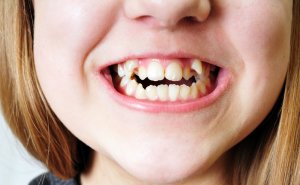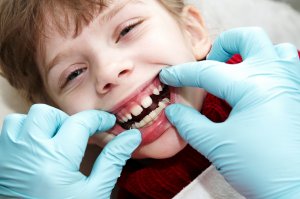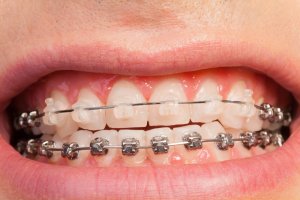An open bite, a type of malocclusion where some of the teeth don’t meet when biting down, often occurs in the transition from milk teeth to permanent teeth. The problem normally corrects itself and doesn’t persist into adulthood. But if a child gets older and still has an anterior open bite then treatment will be needed to avoid problems later in life.
Needing dental work can be worrisome, but our aim is to provide you with all the information you need about open bite treatments so you know what to expect. We’ll talk about:
- The definition of an open bite
- Open bite symptoms
- The problems caused by an open bite
- Your treatment options
If you’re thinking of fixing your open bite with veneers, dental braces, clear aligners or surgery then we hope this guide helps you make an informed decision.
What’s the definition of an open bite?

An open bite occurs when some of the top and bottom teeth don’t make contact when your teeth are closed. The normal position of the teeth is that the top front teeth sit slightly in front of the bottom ones and a little bit lower, with the molars at the back connecting with each other.
With an open bite, the teeth don’t come together properly and there is a visible gap between the top and bottom jaws.
It’s possible to have an open bite along with another type of bite problem such as an overbite/overjet, underbite or crossbite. You can read more about each of these in our separate articles.
Anterior open bite
Anterior open bite is defined as the front teeth not connecting properly when the back teeth have already made contact. Between 1.5% and 11% of the population may experience this to some degree, depending on the country.
The opposite is a posterior open bite, where the back teeth don’t touch when the front teeth are closed. This type of open bite isn’t so common, but it can sometimes happen during treatment with braces. Your dentist will spot it and take steps to correct it if the issue arises.
What are the symptoms of open bite?

An open bite is usually easy to spot just by looking at your teeth when you bite down naturally. You’ll see a gap between the top and bottom teeth, either at the front or on one or both sides.
In cases where the condition is caused by a problem with the jawbone, it’s often because there is too much bone growth at the back of the upper jaw. This pushes the teeth out of alignment, causing the front teeth to protrude (known as an overjet).
An open bite exists when your back teeth touch before your front teeth come together. There’s a gap between the front upper and front lower teeth when you’re biting down completely.
An open bite can be due to your inherited jaw growth pattern. It can also be caused by an injury or behavioral factors like thumb sucking.
If left untreated, an open bite can lead to an unflattering appearance in addition to a number of other concerns:
- A lisp or other speech difficulties.
- Excess forces on the back teeth which could cause them to wear down or crack.
- Trouble with biting and chewing food.
- Issues with swallowing.
- Altered saliva flow.
An open bite is treatable at any age, but it’s generally easier and with more options to treat as a child or teen.
Dr. Greg Nalchajian, Nalchajian Orthodontics
Open bite causes
There are a few different reasons why an open bite can develop. These include:

- Being passed down through genes
- A problem with the jawbone
- Milk teeth and adult teeth coming though out of order
- Tongue thrusting
- Thumb, dummy, pen, or pencil sucking
- Temporomandibular joint problems
Genetic causes are pretty much unexplored by doctors, but if there is a history of problems with jaw development in your family it is likely your child will have a similar experience.
If the condition is caused by bone issues it will be known as a ‘skeletal open bite’, whereas when it’s caused by actions like tongue thrusting or dummy-sucking it is a ‘dental open bite’.
Open bite problems
Having an open bite can cause some quite noticeable problems, such as:
- Self-consciousness if your smile isn’t how you would like
- A lisp or other speech impediments
- Increased wear on the back teeth
- Difficulty eating some foods
To find out more about the problems this condition can cause and what the treatment process is like, view Alex’s story from the British Orthodontic Society. He talks about the ‘sandwich dilemma’ which prompted him to have surgery to fix his open bite.
Open bite problems in children
It isn’t uncommon for infants and young children to have an open bite; it will normally fix itself around the age of four. When your child starts to lose their milk teeth and the adult teeth begin to erupt, it is normal for the teeth to not always meet in the middle.

Once a few of the adult teeth have come through, your dentist can check the alignment of the new teeth and, if there are any problems, advise you about the options for correction.
If a child sucks their thumb, uses a dummy too often, or generally spends a lot of time putting things in their mouth, this could affect their bite as their teeth develop too. Here are some tips for helping your child to break a thumb-sucking habit.
Problems due to tongue thrusting
A major cause of open bite problems is tongue thrusting. This means that when you swallow or talk, the tongue thrusts forwards into the mouth. Through this process, the front teeth are gradually forced outwards into an open bite.
Tongue thrusting is common in young children, but they usually grow out of it by the age of four. This article has more detailed information about tongue thrusting. If the habit persists there are treatment options you can pursue, which we’ll discuss below.
Jaw problems
The temporomandibular joint (TMJ) is the hinge that allows your mouth to open. Some people have problems with this joint and so they move their mouth and tongue around to feel comfortable. It may feel more comfortable to rest the tongue quite far forward in the mouth, or between the teeth, but this can push teeth forward and cause an open bite.
The underlying problem that is causing the issues with the jaw joint need to be addressed, along with treatment to fix the open bite problem.
When an overbite is left untreated, the upper teeth may continue to move out of position. This can put pressure on the surrounding gums and may lead to gum recession. This recession may then lead to tooth sensitivity due to the exposed roots. Additionally, teeth may be more susceptible to chipping on their edges since the upper and bottom teeth aren’t supporting each other.
Dr. Joseph Salim, Sutton Place Dental Associates
Treatment options

Open bite treatments are common and well understood by dentists and orthodontists. Catching the problem in early childhood increases the chances of being able to fix an open bite without surgery. For adults, open bite surgery is a more likely option.
Your dentist is the best person to tell you about your treatment options. Anyone under 18 years old will receive free dental treatment on the NHS if it is needed, and the decision to treat adults is based on medical need.
Open bite braces costs depend on the treatment needed; you can read our guide to braces for adults to discover more about prices for private treatment.
The table below has a brief overview of the various open bite treatment options available according to age. Following this there is more detail on each of these treatments.
Age | Treatment / intervention options |
0-4 | Tongue thrusting and open bite are normal |
No need for intervention | |
Restrict thumb sucking and dummies | |
7-10 | A tongue crib can be worn if tongue thrusting persists |
A dentist can recognise if adult teeth are coming through in an open bite | |
Speech therapy for tongue thrusting can start | |
11-17 | Braces can be fitted to correct an open bite |
Tongue thrusting treatment and therapy will still be successful | |
18+ | Jaw surgery can happen now growing has finished |
Untreated open bite in adults nearly always needs surgery | |
Braces and Invisalign are still options | |
Veneers become an option at this age too |
Open bite braces
Treating an open bite with braces is common. The braces will pull teeth back if they are protruding forward and can pull them into proper alignment.
The course of treatment can take anywhere from six months to two years and will need to be followed up with retainers. Wearing retainers is really important to make sure that the teeth don’t go back to their old position.
Below is an example of how a two-and-half-year treatment programme with open bite braces can change your smile. This treatment is quite drastic because of the amount of work required to correct the patient’s open and cross bite. Not everyone will require this degree of correction, so don’t be alarmed!
Treatment for tongue thrusting
If your open bite is caused by tongue thrusting, you need to treat the cause of the problem as well as the dental issues. The most common treatments are:
- Tongue therapy
- Exercises for the tongue
- Appliances like a tongue crib
A tongue cradle or crib is a little bit like a retainer that attaches to your molars. It puts a barrier across your mouth so the tongue can’t push forwards. Exercises and therapy can be offered through a speech therapist; your GP should be able to refer you if this treatment is available in your area.
Stopping the habit of tongue thrusting won’t correct tooth misalignment, but it will make sure the bite problem won’t get worse or relapse after braces treatment is finished.
Can you treat an open bite with clear aligners?
At-home clear aligner treatments like NewSmile can be an effective treatment for some cases of open bite, but it’s not a one-size-fits-all solution. Clear aligners are typically used for spacing and crowding conditions, but they can achieve great results with minor bite issues too.
Compared to metal braces, at-home aligners are also much more affordable – with SmileDirectClub costing just £1,639 (or monthly payments of £69.43) – making them an easy and convenient way to treat some cases of open bite.
Clear aligner treatments may help with open bite but we always recommend that you check with your dentist first, before starting any treatment.
Can Invisalign treat an open bite?

Yes, this is one of the many types of malocclusion that the Invisalign system is able to help with. This treatment involves clear, plastic aligners that fit over your teeth.
The NHS won’t fund open bite correction with Invisalign treatment or other aligner braces; only with metal braces. However, many people choose to pay for private treatment in order to access this less noticeable treatment method.
You may also want to book an appointment with an Invisalign dentist or orthodontist near you to discuss your treatment options in detail and find out how much Invisalign open bite treatment will cost.
Can you fix an open bite with veneers?
If your open bite is very minor, it may be possible to fix it with veneers. Veneers are a kind of thin tooth covering made from ceramic or composite material. To fit veneers, a small amount of enamel must be scraped off the tooth first. Read our full guide for more details about teeth veneers.
Although it’s possible to fix an open bite with veneers, it might just end up masking the problem. Some of the negative aspects of using veneers in this way are:
- Your teeth will look bigger. The veneers will need to be longer than your natural teeth to close the gap.
- More problems with the alignment of your teeth might crop up because of the new forces introduced into your mouth.
- Any future braces or jaw surgery you may need will be harder because the brackets of braces can’t stick well to veneers.
- It probably won’t fix underlying issues such as tongue thrusting, or the increased wear on the back teeth.
Seek advice from your dentist about using veneers to fix your open bite. There is a lot to consider about the long-term future of your oral health.
Saying that, for a very small open bite that doesn’t cause speech or eating problems, this may be a handy way to improve your smile quickly.
Open bite surgery

Depending on the severity of the open bite, surgery may be needed. Adults are more likely to need surgery since the bones have fused and are less easy to move.
Open bite surgery on the NHS is free for under 18s, and if there is a medical need for it, open bite surgery costs should be covered by the NHS charges for adults.
Because of the practical problems that this condition can cause, it’s worth seeking NHS treatment – even as an adult. If you need open bite jaw surgery, the costs can be between £2,000 to £6,000 for private treatment.
Usually, you will need to wear braces for around one year before jaw surgery, and for another 6 months to a year afterwards. You won’t have any scars because all of the work happens inside your mouth, but you’ll be on a liquid diet for a few days after and there is likely to be some swelling.
For more information about jaw surgery you can read this handy leaflet put together by an NHS trust.
To get some insight into the process of recovery from jaw surgery, you can check out this video:
Risks of open bite surgery
As with any surgery, there are some risks involved. However, jaw surgery is pretty common and the healing process is well understood.
Doctors can use computer modelling to map all of the adjustments they will have to make. The process of having your bones broken and plates and screws inserted does sound scary, but the benefits of being able to eat well and have improved speech will be worth it.
Conclusion
Open bites are normally easy to spot when a child is quite young, and corrective steps can usually be taken, such as wearing a tongue crib or undergoing orthodontic work. Open bite braces cost nothing for children under 18 on the NHS, and the associated problems with eating and talking are likely to mean that treatment is deemed necessary.
Adults are assessed on a case-by-case basis, depending on the problems they are experiencing. Those who aren’t eligible for NHS treatment, or who would prefer not to have metal braces, might be able to use invisible braces to correct an open bite.
FAQs
Can you get open bite treatment without surgery?
Yes, but it depends on how severe your open bite is. An orthodontist will be able to assess your case and discuss your various treatment options. You will probably need braces or clear aligners to realign your teeth.
Will an open bite correct itself?
In children, an open bite may correct itself as the jaw develops. It should be closely monitored by a dentist in case orthodontic treatment or surgery is deemed necessary. But an open bite in adults with a fully developed jaw won’t correct itself.
Can you get open bite treatment without braces?
Correcting an open bite will almost certainly involve orthodontic treatment. However, clear aligners are one alternative to fixed metal braces, if that’s what you’re trying to avoid.
BOS: Alex’s Story. Consulted 4th June 2019.
NHS: A guide for patients considering orthodontics and jaw surgery (Orthognathic Treatment). Consulted 4th June 2019.
New Park Orthodontics: What is a tongue crib and how does it help tongue thrusting habits. Consulted 4th June 2019.
WebMD: 9 Ways to Wean a Child off Thumb Sucking. Consulted 4th June 2019.
IOSR Journal of Dental and Medical Sciences: Anterior Open Bite: Review and Management. Consulted 5th June 2019.




